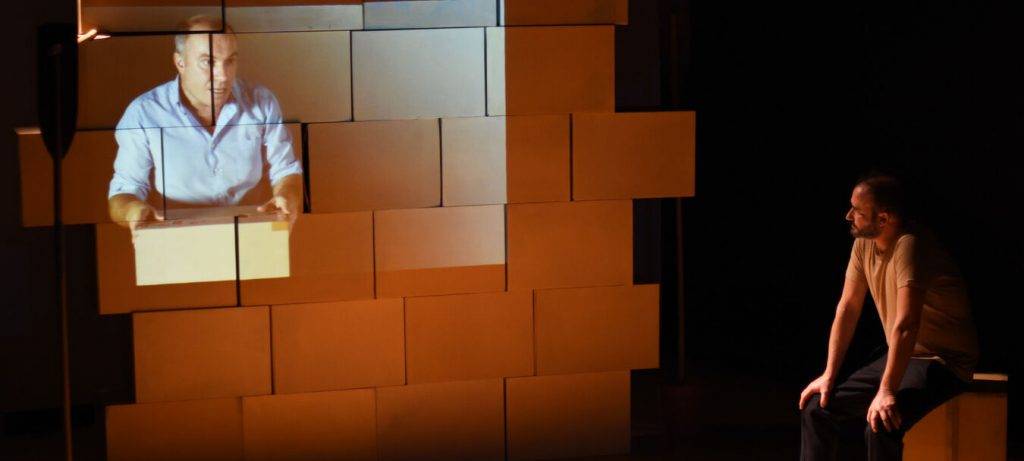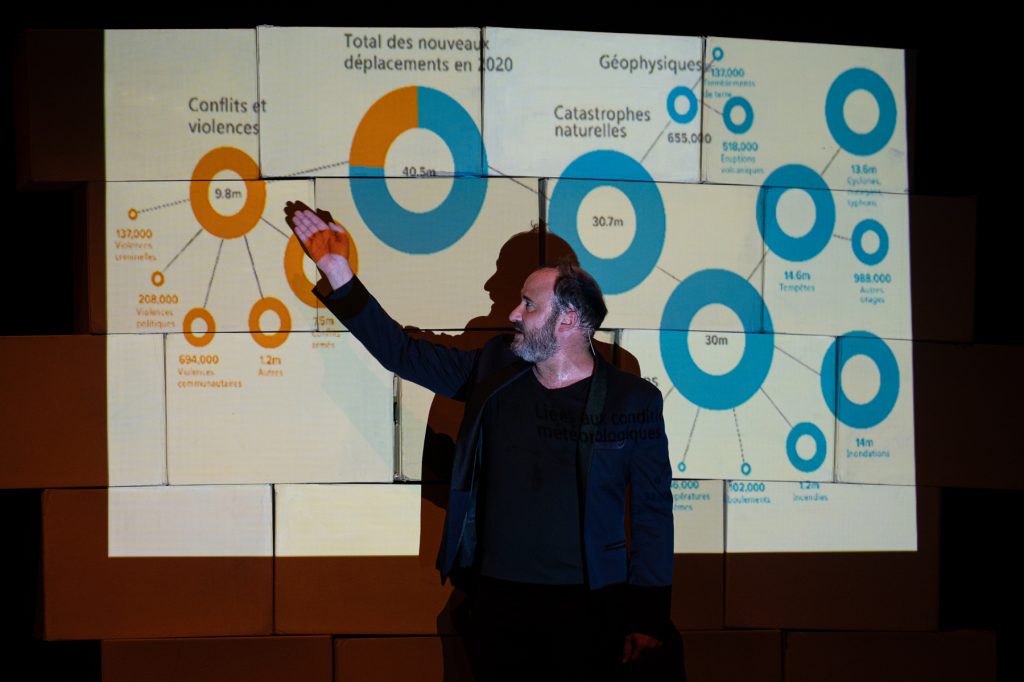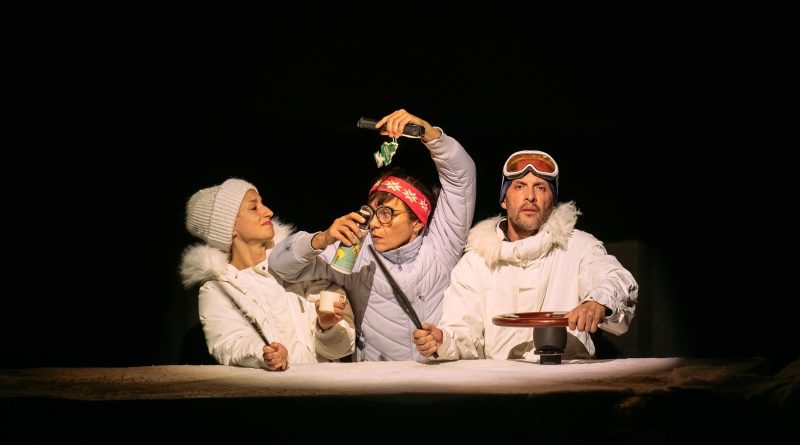Theatre outings – one of the best ways to learn about the environment
Two trips
In January 2025, the class of S5L2 French, EEB1, had the chance to go to two theatre plays, both connected by their theme: environment. On Wednesday 8th, we went to ‘le Théâtre des Tanneurs’ to watch ‘Dimanche’. Around a week later, on Friday the 17th, we went directly from school to Saint Gilles, where we then watched ‘Le pas de l’Autre’ at ‘La Tricoterie’.
‘Dimanche’

This unique play focuses on extreme climate change and the unfortunate outcomes that sometimes lead to destruction. Written by Julie Tenret, Sicaire Durieux, and Sandrine Heyraud, this seemingly comical is composed of different climate change stories as seen through the eyes of different characters. This entire play is performed without the use of any dialog, except for a short sentence in Russian said by one of the interviewers in the story. Three actors play all these different parts by effectively using costumes to avoid confusing the public.
Whether it be the family witnessing how everything in their house melts because of the heat, a team of reporters travelling the world and getting caught in a hurricane, or different animals losing their family due to the climate, these absurd scenarios soon turn catastrophic as the audience realises the gravity of the situation at hand. The play ends with a tsunami taking everything over, flooding the world.
Beautiful visuals come to play in this last part, making use of props and lighting and puppets and sound effects to imitate sea animals underwater interacting with objects like a chair or a toaster, giving it an almost peaceful ending, despite the fact that the whole world is now submerged in water.
‘Le pas de l’Autre’

Political and poetic, this theatrical conference is presented as an attempt to answer the question posed by migration and climate change, explaining in detail the causes as well as actions taken towards, or even against human migration.
Throughout the speech, Franck Gazal, actor and comedian, shares stories and information researched by François Gemenne. His way of telling these stories stirs the audience’s emotions, making us think about how the people forced to leave their countries in search for a better life aren’t just a number on a paper. They are real people with real lives, all hoping and striving to have a place to stay and thrive.
The stage and layout are simplistic, yet effective. With around two dozen cardboard boxes, a podium and a few props to keep the audience’s attention, the actor can focus on delivering points effectively, moving around the stage strategically. The actor interacts with the videos and images projected onto the wall of stacked boxes, until he finally lashes out and breaks the wall down, scattering the boxes all over the stage.
It ends on a calm yet almost urgent note, also making it the only positive note we hear him say throughout his speech. He talks about how even though it’s too late to go back to what the world once was, how it’s too late to “save” the world, we can still act now in order to keep the world from slowly decaying.
Differences and similarities

These two productions tackle the same topic: the environment. However, this vague theme allows for different focus points and approaches. On one hand, ‘Dimanche’ uses fiction to portray actual catastrophic events that have taken place in the past and continue taking place today. On the other hand, ‘Le pas de l’Autre’ focuses on the impact climate change has on humans and how they react to it, having no choice but to leave their countries, risking their lives hopefully for a better future.
‘Dimanche’ is played by three actors, giving it more freedom when deciding how to tell a story. However, ‘Le pas de l’Autre’ is basically a speech given by one actor, helping the public to focus on every word he has to say. Both manage to get their story across, even when evoking them in different ways.
While ‘Dimanche’ relies on visuals to get the audience to listen, ‘Le pas de l’Autre’ relies on stories to get the audience to think. They may sound quite different at first glance, but deep down both plays are just trying to get the audience to care about the environment enough to act.
Personal opinion

As someone who has watched both plays firsthand, I must say both are very interesting in their own way. While ‘Dimanche’ has more visual examples and a more fictional side to it, ‘Le pas de l’Autre’ focuses on delivering its information through shocking, impactful stories. Both successfully convey the points they have to say, but if I had to choose a favourite I would go with ‘Dimanche’.
This is simply because visuals help me understand something better than spoken words. Seeing the animals slowly losing their family due to climate change made me think about how many actual animals this is happening to. Watching the tsunami slowly yet menacingly creep towards one of the interviewers made me think of how much destruction is caused by them every time we travel to a city anywhere in the world.
These seemingly insignificant points might not make much of a difference, but if many people watch theatre plays like this and get their mind changed too, acting together might just be enough to make a difference.
Sam Romero / S5ENB / EEB1
Le Pas de l’Autre est une pièce qui touche principalement le sujet du réchauffement climatique et des migrations d’une manière très créative. Interprété par un seul acteur, cette pièce présente la réalité du réchauffement climatique. Le changement climatique ne se situe plus dans un futur lointain, mais il est déjà présent. En 2024, la température a augmenté radicalement, ce qui cause beaucoup de catastrophes naturelles intenses, affectant des milliers de personnes à travers le monde entier. Ces catastrophes forcent de nombreuses de personnes à migrer, cherchant de meilleures conditions de vie. Ce processus n’est pas du tout simple : le trajet peut conduire à des situations tragiques aux frontières. Le Pas de l’Autre interroge notre responsabilité face à ces crises et appelle à une action urgente pour protéger les populations vulnérables. Personnellement, j’ai vraiment aimé cette pièce parle que j’ai appris beaucoup de nouvelles choses et j’ai entendu des informations intéressantes. La musique, les lumières et l’acteur ont également ajouté à cette bonne expérience. / Anna G.
Je pense que la pièce de théâtre était une bonne idée. Elle était bien faite et j’ai plutôt tout compris mais l’acteur parlait trop de thèmes similaires, c’est donc devenu ennuyant après un certain temps. J’ai appris beaucoup de choses que je ne savais pas et dont on ne parle pas assez. Je m’attendais aussi à une pièce normale comme dans tous les théâtres mais ce qu’ils ont fait à la Tricoterie était aussi une bonne idée. / Tymon G.
J’ai aimé le spectacle Le pas de l’autre car il explique les migrations et comme elles sont profondément liées au changement climatique, de manière simple et captivante pour les jeunes. J’ai apprécié la façon dont le sujet a été développé en donnant une vision globale du problème, en montrant les différents secteurs qu’il touche, avec quelques notes d’humour qui tenaient le public engagé. Cependant, si on cherche des solutions pour prendre part activement et s’opposer au problème, ce n’est pas ici qu’on va les trouver. On va sortir avec un nouveau point de vue sur le futur et une compréhension meilleure de la géopolitique actuelle. / Mathilde Zadra
La pièce de Théâtre Le Pas de l’Autre était pour moi une pièce captivante car celle n’était pas ordinaire. Elle était très simple : les accessoires consistaient seulement en quelques cartons. Je ne m’attendais pas à cela car dans le théâtre, on utilise beaucoup d’accessoires différents. Le nombre de comédiens m’a étonné car il y avait un seul comédien. La combinaison entre la présentation du réchauffement climatique et la mise en scène m’a surpris. La fin était très silencieuse et ne faisait pas beaucoup appel à la musique. Pour conclure, on peut dire que c’était une pièce très simple. / Reinhold K.
J’ai beaucoup apprécié la thématique de la pièce, car c’est important d’être informé sur les choses qui se déroulent autour de nous. La mise en scène était plutôt différente de ce à quoi je m’attendais ; parfois le comédien dansait, et un instant plus tard, il nous criait dessus. Le décor était vraiment minimaliste, mais représentait très bien le message à transmettre. La pièce de théâtre, à l’origine une conférence sur les thèmes de géopolitique et de climat, nous a introduit ces thèmes de façon théâtrale et très artistique, un moyen de les faire entendre à tout le monde. / Mira G.
A mon avis, le spectacle était très bien. J’ai beaucoup aimé. Mais il y a un point dans le spectacle qui ne m’a pas plu, c’est quand Franck, l’e comédien a crié. Par contre, ce qui était drôle, c’est quand il a dansé. / Luca Laudi
Ce qui m’a dérangé dans ce spectacle était que l’interaction avec le public était inaboutie. J’avais l’impression que de temps en temps, le comédien attendait une réaction de ce public. C’est probablement à cause de la forme de spectacle car ce n’était pas un vrai spectacle mais plutôt une conférence. C’est dommage que l’échange entre le comédien et les spectateurs n’ait pas été plus évidente. / Bruno Górnicki
J’ai vraiment aimé le spectacle car c’était émouvant et plaisant. C’était un bon spectacle, mais il y avait des inconvénients comme le pessimisme de l’œuvre. Je ne m’attendais pas que ce soit si captivant et si intéressant. Je ne pensais pas qu’un spectacle informatif pouvait être si interactif. La mise en scène était vraiment simple, c’étaient seulement des boîtes en carton et un comédien qui parlait avec un écologiste (qui étudie le flux migratoire grâce à l’écologie) sur un écran. Pour conclure, cette interprétation m’a vraiment plu même si c’était un peu pessimiste et trop centré sur la question des migrations. / Csongor Z.
Personnellement, j’ai trouvé ça très ennuyeux. Je comprends le message, mais je n’ai pas trouvé cela très drôle. Je pensais que l’humour était très forcé et les blagues plutôt inutiles. / Olivia K.
La pièce de théâtre était assez bien et je conseille d’aller la voir. Le comédien jouait très bien et le contenu était très intéressant. Cela nous apprend beaucoup de choses. Par contre, le décor était assez simple et l’introduction à la pièce de théâtre n’était pas très clair. / Ines G.
Mon expérience au cours de cette pièce de théâtre a été intéressante dans le fait d’écouter et de voir jouer un comédien. Je pense que c’est agréable de découvrir ainsi des informations incroyables qui vous laissent la bouche ouverte. En résumé, ceci m’a beaucoup surpris car on est partagés entre le mis et la tristesse, mais dans une façon drôle. / Markus Pirotta
J’ai bien aimé la pièce de théâtre car c’était une pièce à la fois comique et informative. J’ai bien apprécié comment le réalisateur a réussi à transformer une conférence, qui n’aurait peut-être pas été aussi intéressante, en une pièce de théâtre aussi captivant tout en conservant les mêmes informations. / Carmen Dussiel




